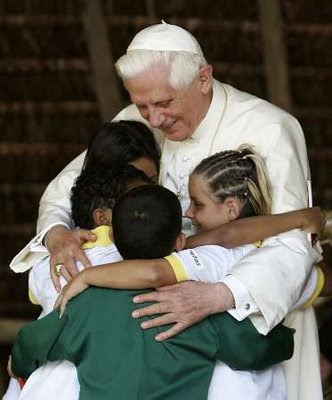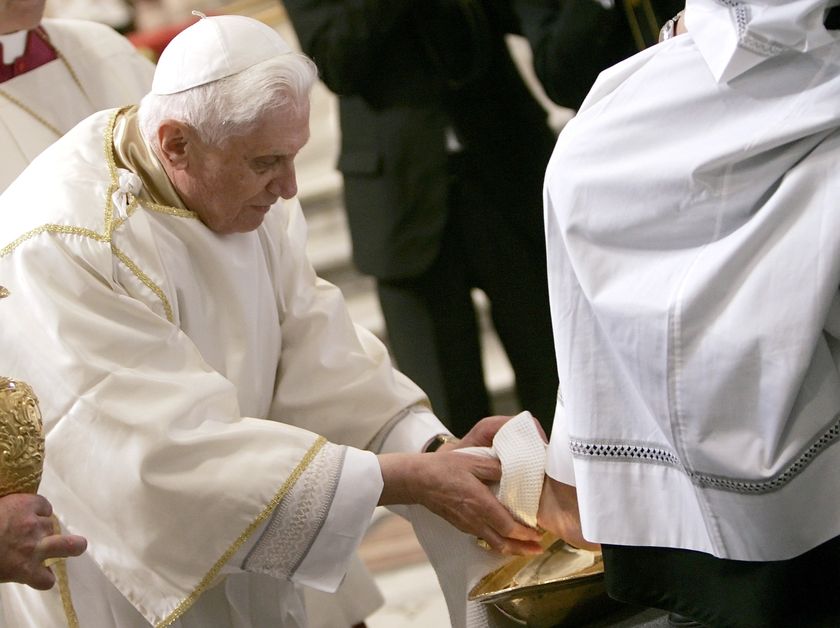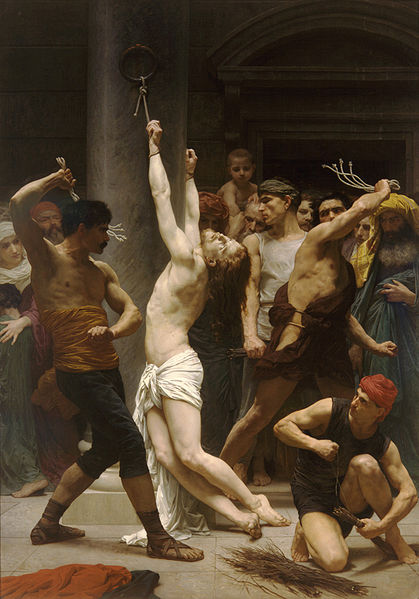corianderstem
Blue Crack Distributor
Child molestors being shielded by people who claim they act on behalf of that rebel from Nazareth.
How can any ethical person continue to support the Catholic Church?
Child molestors being shielded by people who claim they act on behalf of that rebel from Nazareth.
I've yet to see anyone reference that rebel in this situation.
The terrible revelations of sexual abuse in Ireland and Germany have confirmed the reality that the abuse of children by clergy is not a phenomenon confined to the United States. Nor, as Kieran Conroy, the bishop of Arundel and Brighton in the U.K., stated recently, is the crisis a media creation. "It is real," he said. "It is a reality." Outrage among the Irish and German public is the predominant, natural and justified response. But buried beneath the shock and anger, especially for Catholics, however, is a searing question: How could this happen?
There is an important resource that may begin to answer this question: the detailed analysis of the roots of clerical abuse in this country, which was conducted by The National Review Board, the group of lay people who researched and reported to the U.S. Conference of Catholic Bishops in 2003. Some questioned the independence of the board, but I think that their situational analysis, carried out by committed and highly qualified lay Catholics, is accurate.
Looking at what the National Review Board viewed as the root causes of the crisis in this country may shed light on what happened in Ireland and Germany and elsewhere. On the whole, the board's analysis is about the most accurate and insightful that we have about the American situation. Of course, these are presented by the board as reasons, not excuses. There are no excuses for these crimes.
The board asked two main questions. First, Why did so many priests abuse minors in the U.S.? Second, how could the U.S. bishops have dealt with the issue so poorly, or not at all? Regarding the first question, as I far as I understand, roughly 4% of U.S. priests from 1950 to 2000 were accused of abuse. This is slightly higher than that in other professions, including those who deal with children, like schoolteachers. (Most abuse, most studies show, takes place within families). But any number is too high and leads to the question of how, especially in a religious organization committed to helping others and living out what Christians call Gospel values, this could happen.
The board answers how so many priests could have been abusive by looking at two causes. (Their responses are in boldface. My own comments follow their points.)
1. Improper screening for candidates in the past.
From many conversations with men who entered minor seminaries or religious orders in the 1940s and 1950s, I know that the entrance requirements were less rigorous than today. One priest explained to me that to enter his religious order one needed merely to submit a recommendation from another priest and meet with the local provincial. If the provincial gave his approval, the candidate was accepted.
Compare this to what I faced when I entered the Jesuit Order in 1988: a battery of psychological tests (which culminated in a lengthy psychological evaluation to the Jesuits), six face-to-face interviews, an eight-day retreat, as well as having to submit a comprehensive autobiography, recommendations from six friends and co-workers, a physician's examination, and so on.
Such procedures today -- and especially those put in place after 2002 -- help to begin to weed out those with any serious psychological problems, such as pedophilia. Tragically, they were not in place many decades ago, in this country or abroad.
2. Poor formation or training for candidates.
Once again, it should be noted how different priestly formation and training are today as compared with even 30 or 40 years ago. At least in the U.S., it is difficult for a man to reach ordination without substantial exposure to issues on sexuality, intimacy and chastity, as well as questions of sexual abuse and professional boundaries. In the past, however, a great many priests at the time of their ordination failed to receive adequate training or counseling in any of these issues, setting the stage for problems in the future.
The board's second question was: Why did the church leaders respond to the problem so poorly for so many years? Here is where the board's analysis is especially astute.
1. Some bishops and other leaders did not understand the broad nature of the problem, but treated it sporadically.
Like many other people, even well educated men and women, particularly if we are talking about the 1960s, 1970s and even 1980s, most of the American bishops simply did not grasp the terrible prevalence of in our society of such things as pedophilia, incest and spousal abuse. (Megan's Law, for example, was passed as late as 1996, a testimony to this fundamental lack of understanding of these things in American society.) The bishops were among those still in the dark about this dark side of human behavior, and simply were at a loss to appreciate the magnitude of the problem. The same was most likely true in Europe as well.
2. Many bishops put needs of institutional concerns above the concerns of the people. Historically, there is a deep antipathy to "scandal" in the Catholic Church.
In the church, where the community is seen as the "Body of Christ," that is, a visible representation of Christ's presence, and where Tradition is seen as one way that the Holy Spirit leads the Christian community over time, an attack on the church is often interpreted as tantamount to an attack on the faith itself. Similarly, the notion that the faithful needed to be "protected" from scandal (lest it lessen their love and respect for the church) made bishops less likely to admit even obvious problems with abusive priests. The horrible irony was that in protecting the faithful from "scandal" by concealing evidence of abusive priests, as well as shuffling them between parishes, some of the American bishops created the greatest scandal in the history of their church in this country. The Irish and German churches are also now seeing the fallout from "avoiding scandal."
3. The threat of litigation caused many to adopt an adversarial stance.
Protecting the church is, particularly for a bishop, much more than simply protecting the "institution." The financial losses that might be incurred from lawsuits were also (accurately) seen as losses that would damage the great many social services provided by the church: parishes, schools, hospitals, shelters. Some American bishops felt the need to protect this network of social-service agencies and so followed the advice of those lawyers who suggested adopting the most aggressive attitudes towards lawsuits. Sadly, those bishops failed to realize that those institutions, noble as they are, were not the only things that they should have been protecting.
4. Some bishops failed to comprehend the magnitude of the harm suffered by victims.
Needless to say, when some U.S. bishops failed to even meet with victims, a shockingly callous act, it was easy to ignore their suffering.
5. Many bishops relied too heavily on psychiatrists, psychologists and lawyers when making decisions.
Even today, and even more so in the 1960s and 1970s, when many cases were first brought to light, many bishops turned to mental-health professionals who themselves held conflicting opinions about the treatability of pedophilia. Is it curable? Is it genetic? Can a man be placed in active ministry after treatment? What is the best type of treatment? Would being placed in active ministry help the man in his "cure"?
Bishops, hardly experts in these matters, often relied on flawed advice. Or they chose experts who told them what they most wanted to hear: that the man could be cured and returned to ministry. Still, it needs to be underlined that this does not excuse the bishop who moved the man who repeatedly abused and was just as repeatedly reassigned. One need not be a psychologist to see the stupidity of such decisions. And of course more recent decisions, say in the 1990s, are even more indefensible, given society's (and the psychiatric profession's) growing knowledge about pedophilia.
6. Many bishops avoided confronting abusive priests.
The simple inability to confront and deal with difficult situations, whether out of apathy, ignorance or fear of conflict, seems to have played a major role in the crisis. This is something that cuts across cultural lines, and may have even been worse in European countries.
7. Many bishops placed interests of priests above those of victims.
The image of the bishop as the "spiritual father," who protects and guides his priests has deep roots in the Catholic Church. Tragically, often overshadowed was the bishop's larger and more important role as "pastor" or "shepherd" of all of the people in his diocese. Even worse, the welfare those who were most vulnerable--young children--was often ignored.
8. Canon law made removal from ministry onerous.
The process of "laicization," that is, returning the priest to the "lay state," and stripping him of his rights as a priest (the ability to celebrate Mass, wear a collar, call himself "Father") is a cumbersome ecclesiastical process, designed to preserve the rights of the priests. Entering into it may have seemed overwhelming for some bishops. Indeed, Archbishop Rembert Weakland of Milwaukee, as reported this week by The New York Times, was forced to appeal directly to the Vatican to remove a notoriously abusive priest from ministry.
Those were the board's findings. I would like to add four more reasons that I note from my own observations over the years.
1.) Some American bishops, mostly elderly men, were themselves uncomfortable, for a variety of reasons--some personal, some cultural, some familial, some related to their formation--discussing any matters of sexuality, particularly homosexuality, as well as the more frightening topics of pedophilia and ephebophilia, and the terrifying prospect of child sexual abuse. Again, this may be even more pronounced in Ireland and Germany among bishops and clergy.
2.) Some bishops here were hampered by the inability to discuss the possibility that the scandal would lead to dramatic change in the church. If one fears a discussion of difficult church issues (celibacy, clerical culture, episcopal authority) one will naturally be more afraid of an issue that might provoke open up such discussions.
3.) Some bishops were unable to accept personal responsibility or their own sinful (sometimes criminal) actions. From the beginning of the crisis, many of the bishops seemed to confront the crisis in the manner of a C.E.O., rather than as a Christian pastor. Some seemed to have forgotten that an essential part of the traditional "sacrament of reconciliation" (that is, "confession") in the church is penitence: the need to make amends for one's sins. It is not simply enough to confess, to admit sinfulness, and to beg for forgiveness from God and the person you have offended. One needs also a "firm purpose of amendment" and the willingness to engage in some form of penance. But public penance, like the resignation of Bishop John Magee in Ireland last week--is too rare.
And of course, like anyone else, clergy are subject to the law of the land, and, if found guilty of crimes, should be be treated like anyone else.
Around the time that the scandals were breaking in the U.S., a Catholic sister I know said that the Christian response was at odds with what she called the "corporate response." Quoting from the parable of the Prodigal Son in the Gospel of Luke, she described what a Christian response from an offending bishop would have sounded like: "I have sinned against God and you, and I no longer deserve to be called your bishop. I will resign and spend the rest of my life praying for victims." Beyond any criminal penalties to be paid, such an action might have been understood by Catholics. Tragically, some bishops, the "teachers" par excellence in the community often ignored the treasures of their own Christian heritage
4.) When cases of abuse were raised prior to 2002, some bishops viewed the media as adversaries. Prior to the crisis, Cardinal Bernard Law said that he "called down" the power of God against The Boston Globe. Despite some lingering anti-Catholicism in the American media's coverage of the crisis (for example, their facile conflation of celibacy and pedophilia, the overlooking of abuse in other professions, and their stereotyping of all priests as abusers and all bishops as conspirators), the church needs to be grateful for the role of the media for revealing what the church itself was unwilling to confront. The "Charter for the Protection of Children and Young People," adopted by the U.S. bishops in their meeting in Dallas in 2002, would not have happened without the Boston Globe.
Those are but a few reasons for the causes of the sexual abuse of children by clergy in the United States, as a board of committed Catholic laypersons saw them. This may begin to explain how and why these sinful actions and awful crimes happened. And how and why these terrible crimes and grave sins happened in Ireland and Germany, and elsewhere.
Sorry Rev but you are 99.8% wrong.
The problem is the Catholic church. There are two things going on here. You've equated sex with shame for far too long, and you've created a safe haven for pedophiles.
This is not the media's fault, this is your fault.
He didn't blame the media, in fact he said the church should be thanking it for uncovering this.
And the catholic church is not a safe haven for pedophiles, at least not anymore. I think a lot of people forget that most of these crimes happened in the 60's and 70's. (Not all, most). Big changes have been made to how one can become a priest, and I'm sure that as time goes on and those who abused children die off, this will become a rare occurence that when it comes up will be dealt with the right way by the church.
Has it gotten better? Maybe, hard to tell, you also have to remember that abuse victims can sometimes take a lifetime to deal with, open up about, etc... There have been plenty of cases in recent decades that still leads most of us believe the problem still exists.
I think a lot of people forget that most of these crimes happened in the 60's and 70's. (Not all, most).
Today, bishops that would have tried to ignore it most likely wouldn't do the same thing today, because they know what would happen.
There was an article in Newsweek back when all the abuse was happening here in the U.S. that suggested that the reason why so many priests become pedophiles is because they enter the seminary so young and are taught early on to reject sexuality. As a result, they become emotionally and sexually immature. I think Yolland mentioned this some time ago.




